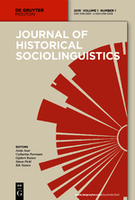
Journal of Historical Sociolinguistics
Scope & Guideline
Connecting Historical Contexts to Linguistic Change
Introduction
Aims and Scopes
- Historical Language Variation:
The journal investigates how languages have varied over time, influenced by social factors such as class, ethnicity, and contact with other languages. - Sociolinguistic Contexts:
It emphasizes the role of sociocultural contexts in shaping language, exploring themes like identity, power dynamics, and community practices. - Multilingualism and Language Contact:
The journal examines cases of multilingualism and language contact, focusing on how these phenomena affect language change and development throughout history. - Archival and Historical Documents:
Research often relies on primary historical sources, such as letters, court records, and literature, to provide insights into past language use and social interactions. - Interdisciplinary Approaches:
The journal encourages interdisciplinary research that integrates perspectives from linguistics, history, sociology, and cultural studies to enrich the understanding of language phenomena.
Trending and Emerging
- Language and Social Mobility:
Recent publications have increasingly focused on the relationship between language use and social mobility, examining how language reflects and influences social status and movement. - Gender and Language Variation:
There is a growing trend in exploring gender dynamics in historical language use, particularly how language reflects and constructs gender identities and roles across different eras. - Language in Colonial Contexts:
The journal has seen a rise in studies about language use in colonial settings, highlighting how colonialism has shaped language practices and contact phenomena in diverse communities. - Digital Humanities and Language Studies:
Emerging methodologies that utilize digital tools and resources for studying historical language data are gaining traction, reflecting the journal's adaptation to new research technologies. - Sociolinguistics of Emotion and Address:
There is an increasing focus on the sociolinguistics of emotion and how interpersonal address forms reflect social relationships and emotional dynamics in historical correspondence.
Declining or Waning
- Traditional Dialect Studies:
There seems to be a shift away from traditional dialect studies that focus solely on geographical variation, as recent research emphasizes social factors and individual agency in language use. - Prescriptive Language Norms:
The journal has seen a decline in papers centered on prescriptive norms and grammar rules, indicating a move towards more descriptive and socioculturally informed analyses. - Language and National Identity:
While still relevant, the exploration of language as a marker of national identity appears to be less frequent, possibly overshadowed by more nuanced discussions of intersectionality and identity. - Historical Linguistics as a Standalone Discipline:
There is a noticeable decrease in research that treats historical linguistics as an isolated field, with a preference for integrating historical linguistic analysis within broader sociolinguistic frameworks.
Similar Journals
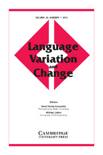
Language Variation and Change
Unraveling the Threads of Language EvolutionWelcome to Language Variation and Change, a prestigious journal published by Cambridge University Press and dedicated to the rigorous exploration of linguistic diversity and its evolution. With an ISSN of 0954-3945 and an E-ISSN of 1469-8021, this journal has been a pivotal platform for scholars since its inception in 1989, continuing to publish cutting-edge research up to 2024. Language Variation and Change is recognized in the top quartile for Linguistics and Language (Q1) and holds an impressive Q2 ranking in Education for 2023, underscoring its significant contribution to these fields. Its strong Scopus rankings—placing it in the 86th percentile for Arts and Humanities in Language and Linguistics—highlight its impact and quality. This journal aims to foster a deeper understanding of the dynamic interplay between language and society, making it essential reading for researchers, professionals, and students eager to engage with the latest findings and theoretical discussions in the arena of sociolinguistics. Stay connected with the evolving landscape of language studies through Language Variation and Change.
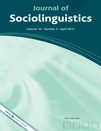
JOURNAL OF SOCIOLINGUISTICS
Advancing Understanding of Linguistic DiversityThe Journal of Sociolinguistics, published by Wiley in the United Kingdom, is a leading interdisciplinary journal that explores the intricate relationships between language and society. With an impressive impact factor reflecting its Q1 quartile ranking in Histories and Philosophy of Science, Linguistics, Philosophy, and Sociology, this journal is recognized for its scholarly contributions, making it a vital resource for academics and practitioners in these dynamic fields. Covering a wide scope of topics from language variation and change to sociocultural dynamics, the journal has converged from 2004 to 2024, ensuring a comprehensive understanding of contemporary sociolinguistic issues. Although operating under a traditional access model, the Journal of Sociolinguistics remains pivotal for advancing critical dialogue and research for professionals, researchers, and students invested in linguistic and sociological studies.

Journal of Jewish Languages
Bridging History and Language in Jewish StudiesThe Journal of Jewish Languages, published by BRILL, is a leading academic platform dedicated to the interdisciplinary study of Jewish languages, exploring their historical, cultural, and linguistic dimensions. With an ISSN of 2213-4387 and an E-ISSN of 2213-4638, this journal serves as a vital resource for researchers and students, offering insights into the evolution and significance of Jewish linguistic traditions from 2015 to 2024. As a Q3-ranked journal in the fields of Cultural Studies and History, and a Q4 ranking in Linguistics and Language, it presents a diverse array of scholarly articles that contribute to the understanding of Jewish languages in various cultural contexts. With commendable Scopus rankings that place it within the 60th to 75th percentile across multiple categories in Arts, Humanities, and Social Sciences, the Journal of Jewish Languages continues to be a pivotal venue for innovative research and dialogue. While the journal is not open access, it nonetheless remains an essential reading for anyone vested in the linguistics and cultural aspects of Judaism.
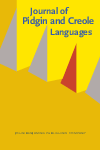
JOURNAL OF PIDGIN AND CREOLE LANGUAGES
Illuminating the Intersection of Language and SocietyJOURNAL OF PIDGIN AND CREOLE LANGUAGES, published by John Benjamins Publishing Co, is a leading international journal dedicated to the study of pidgin and creole languages, offering a unique platform for interdisciplinary research within the fields of linguistics and language studies. With an impressive impact factor reflected in its 2023 Scopus rankings—placing it in the Q2 category for both Linguistics and Language—this journal has established itself as an essential resource for academics and practitioners alike. Covering a broad temporal scope from 1986 to 2024, it promotes innovative research that advances the understanding of language evolution, socio-linguistics, and cultural dynamics. The journal’s focus on both theoretical and practical perspectives makes it particularly valuable for researchers, professionals, and students interested in the complexities of language and identity. Although it does not currently offer Open Access, its commitment to quality scholarship ensures that each issue presents cutting-edge research and critical insights into the world of pidgins and creoles.
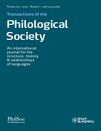
TRANSACTIONS OF THE PHILOLOGICAL SOCIETY
Pioneering Research in Language and LinguisticsTRANSACTIONS OF THE PHILOLOGICAL SOCIETY, published by Wiley, is a prestigious journal focusing on the fields of linguistics and language studies. With a rich history that spans over 180 years, having been established in 1842, this journal continues to contribute significantly to the academic discourse on language and linguistics. It holds an impressive impact factor and ranks in the Q2 category for both Linguistics and Language in the 2023 category quartiles, underscoring its relevance and scholarly influence, as evidenced by its rankings in the Scopus database. Researchers, professionals, and students will find this journal invaluable for accessing high-quality research articles that illuminate various aspects of language and linguistics. While the journal does not currently offer open access, it remains a vital resource for anyone dedicated to advancing knowledge in these fields. Its address in the United Kingdom underscores its international reach and commitment to academic excellence.
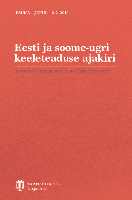
Eesti ja Soome-Ugri Keeleteaduse Ajakiri-Journal of Estonian and Finno-Ugric Linguistics
Elevating the Discourse on Unique Linguistic CulturesEesti ja Soome-Ugri Keeleteaduse Ajakiri - Journal of Estonian and Finno-Ugric Linguistics is a premier academic journal published by UNIV TARTU PRESS, dedicated to advancing the field of linguistics with a particular focus on the Estonian and Finno-Ugric languages. Since its inception, the journal has embraced an Open Access publishing model, allowing researchers and enthusiasts to freely explore its groundbreaking studies and findings since 2013. With an Impact Factor that places it in the Q3 quartile of leading journals within the linguistic domain, it serves as a vital platform for the dissemination of new research and theoretical advancements. Ranked 410th out of 1088 journals in the Arts and Humanities category for Language and Linguistics, it reflects a robust commitment to quality scholarship that appeals to academics, professionals, and students alike. Operating from Tartu, Estonia, the journal aims to foster greater understanding and appreciation of the Estonian language within the broader context of Finno-Ugric studies, making it an essential resource for anyone interested in these unique linguistic cultures.

Concentric-Studies in Linguistics
Pioneering insights into the world of linguistics.Concentric-Studies in Linguistics is a distinguished journal published by the National Taiwan Normal University, College of International Studies & Social Sciences. With an ISSN of 1810-7478 and an E-ISSN of 2589-5230, this journal contributes significantly to the field of linguistics, encompassing a wide range of topics from language acquisition to sociolinguistics. As of 2023, it holds a respectable Q3 ranking in both the Linguistics and Language categories, and it is positioned in the 28th and 24th percentiles within its Scopus ranks for the Arts and Humanities and Social Sciences, respectively. Although it operates under a traditional access model, its publication from 2014 to 2024 reflects a commitment to advancing academic discourse. Researchers, professionals, and students are encouraged to engage with its rich content as it provides a platform for innovative studies and critical analyses that push the boundaries of linguistic research.

NEUPHILOLOGISCHE MITTEILUNGEN
Advancing Philological Insights Since 1971NEUPHILOLOGISCHE MITTEILUNGEN, published by the esteemed Modern Language Society, stands as a significant contribution to the domain of Language and Linguistics. With a history dating back to 1971, this journal has consistently provided an academic platform for researchers and scholars, navigating through the intricacies of philology and linguistic studies. Although it is indexed in Scopus with rankings reflecting its position in the Arts and Humanities and Social Sciences categories, it currently does not offer Open Access, which may require interested parties to seek institutional access for its wealth of content. The journal has experienced periods of coverage discontinuation in recent years, yet it remains a valued source for advancing the understanding of language theories and linguistic practices. Its location in Helsinki, Finland, offers a unique European perspective on global linguistic issues. The journal is ideal for those looking to engage with evolving linguistic trends and contribute to contemporary discussions in the field.

Dialectologia
Pioneering Insights into Dialectal Diversity and VariationDialectologia, published by the Universidad de Barcelona, Facultad de Filología, is a distinguished academic journal dedicated to the fields of linguistics and language studies. Since its inception in 2008, this Open Access journal has made significant strides in disseminating knowledge, fostering scholarly communication, and promoting research in dialectology and sociolinguistics. With its current classification in the Q3 quartile of linguistics and language, and Scopus rankings placing it in the 32nd and 29th percentiles within the Arts and Humanities and Social Sciences, respectively, Dialectologia plays a crucial role in advancing the study of language variation and change. The journal’s commitment to providing a platform for innovative research is underscored by its accessibility to a wide audience, ensuring that researchers, professionals, and students alike can engage with and contribute to contemporary discourse in language studies. Based in Barcelona, Spain, Dialectologia not only enriches academic literature but also connects a global community of language scholars through its compelling and diverse contributions.
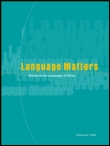
Language Matters
Elevating Research in Linguistics and CommunicationLanguage Matters is a prestigious journal dedicated to the dynamic field of Linguistics and Language, published by Routledge Journals, Taylor & Francis Ltd in the United Kingdom. With an ISSN of 1022-8195 and an E-ISSN of 1753-5395, this journal serves as an essential platform for scholars seeking to explore the multifaceted relationships between language and society. Recognized in the 2023 Category Quartiles as Q2 in Linguistics and Language, it boasts impressive Scopus rankings, sitting at #298 out of 1088 in the Arts and Humanities category and #356 out of 1167 in Social Sciences, highlighting its significant impact on the field with a 72nd and 69th percentile ranking, respectively. The journal's scope encompasses a wide range of topics including language acquisition, sociolinguistics, and psycholinguistics, making it a vital resource for researchers, educators, and students alike. By not offering open access, it maintains a curated selection of high-quality peer-reviewed articles, ensuring that academic rigor and relevance are upheld for its readership. With a publication range spanning from 1993 to 2024, Language Matters continues to shape conversations and advance knowledge in the ever-evolving landscape of linguistic research.